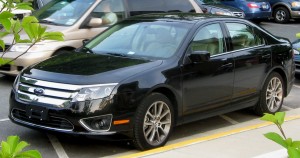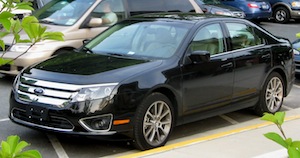[mainbodyad]It always struck me as particularly stupid when people complained about the cost of gasoline, even when I was a teenager with very little money just learning about how investing worked. It seemed perfectly obvious to me that if an increase of $1 per gallon cut into your standard of living, you were living so close to the edge that disaster would inevitably follow. That wasn’t how I wanted to conduct my life.
My highest priority, even as a kid, was to maintain and control my independence. I wanted to do what I wanted, when I wanted, and how I wanted without someone else having control over my time or money. Anything that didn’t get me one step closer to that goal was avoided like the plague, no matter how much I may want it.
If Increasing Gas Prices Cause You Financial Hardship, You Are Too Vulnerable
This led to reticence about buying a car because all I saw was people who had no assets suddenly loaded down with interest payments to the bank to buy something that would ultimately be worthless and, in the meantime, would suck up cash on insurance, gasoline, and oil. Although there was a brief moment when, in desperation, my parents made me get my drivers’ license and use one of their old 1992 Honda Accords to shuttle around my three younger siblings, I remained without a car. You already know that Aaron stuck with his now infamous 1993 Ford Escort with 150,000+ miles or, alternatively, walked everywhere in the years we lived on campus in college.

The cost of owning a car for the average American is $8,776 in 2011, or 58.5¢ per mile for someone who drives 15,000 miles per year. In pre-tax dollars, that requires more than $10,000 in earnings, an enormous percentage of the average family's income.
With the United States dollar continuing its slide relative to other world currencies, resulting in an increase in the nominal quoted value of crude oil and, ultimately, gasoline, you can hear the distant rumblings starting again. I’ve noticed a few newspaper headlines talking about the cost of gas and it seems like a topic of water cooler conversation among some of my less affluent friends.
The key to financial independence is to acquire as many earning assets as you can – things that generate cash for you and your family 24 hours a day, 7 days a week, 365 days a year – and then get it so that your expenses are much less than the cash thrown off so there is an ever-expanding surplus of cash that can be reinvested to the earning assets base. An automobile isn’t a big deal when you are earning enough money that the cost is negligible. But if you are just starting out and have only one asset to sell – your time in the form of a paycheck for wages or salary – it can be the equivalent of financial quicksand, pulling your resources down to oblivion.
Case in point: Sitting on my desk in front of me is a copy of AAA Traveler Midwest, a free magazine published by Triple-A (American Automobile Association) that has an article titled, “Driving costs climb to $8,776 for car owners”. In the article, AAA points out that in 2011, the average American is expected to pay the following per car – so if you have two cars in your household, as most do statistically – you can double these figures! And these aren’t factoring in Bentley or Maserati owners – the figures are based upon the average costs for the 5 top-selling car models in three categories: small sedan cars, medium sedan cars, and large sedan cars.
Breakdown of Car Ownership Costs in 2011 for the Average Car
Variable Costs:
Gas: 12.34¢ per mile
Maintenance: 4.44¢ per mile
Tires: 0.96¢ per mileFixed Costs:
Insurance: $968 per year
License, Taxes, etc.: $595 per year
Depreciation: $3,728 per year
Finance Charges: $823 per yearCost per mile (total) based on 15,000 miles per year: 58.5¢
The Total Cost of Ownership for Cars Is Higher If You Drive an SUV or Mini-Van
[mainbodyad]According to AAA, the costs are much higher for 4-wheel-drive Sport Utility Vehicles (SUV’s), which cost 74.9¢ per mile, on average, to own, or $11,239 per year. The driving costs for mini-vans is 63.3¢ per mile, or $9,489 per year.
Don’t Forget The Cost of Owning a Car Figures Are Mostly In After Tax Dollars!
Now, consider that $5,048 of your annual cost per car ownership are after-tax dollars with $3,728 representing direct taxes and expenses. If you are self-employed and in the 10% tax bracket (say you send in 20% of your income after deductions as a result of your Social Security, Medicare, and income taxes), that mean you would need to earn at least $10,038 per year per car, or $836.50 per month ($5,048 after-tax spend / (100%-20%) + $3,728 after-tax spent = $10,038).
That means the cost of owning a car for the average American requires around $10,000 in pre-tax earnings. The opportunity cost of owning each car is much higher. Consider: If, instead, that same $10,000 had been contributed to a tax-deductible retirement plan that earned 7% annually, at the end of a decade, you’d have at least $120,000 worth of investments generating $8,400 in profit per year!
Practical Applications of the Cost of Owning a Car

If I were starting over, owned a business such as a pizza shop, and had very little capital, I'd live over my business to keep costs as low as possible. Then, I'd use the profits to start building a base of earning assets that churned out cash for me to use for expansion, redeployment into other investments, and later - much later - increasing my standard of living.
About this time in a conversation is when someone – usually someone who has a history of mismanaging their money – speaks up rather incredulously and insists, “But you have to own a car in this day and age.”
Depending upon where you live, this may or may not be true. The problem isn’t with a car per se but rather the emotional worship that older generations of Americans bestowed upon the machines. If I didn’t live in an area that offered public transportation, I’d pay cash for the oldest, safest, lowest-cost vehicle possible and use it only for running errands. In this case, I’d choose my pocketbook over my pride and know that every time I turned on the ignition, the savings were pouring into my bank, brokerage, and business accounts. Most people are too prideful to do that. They just can’t take the idea that they run into someone they know from their past and having that person think they are broke. So they make themselves appear rich instead of being rich. It’s madness. Absolute stupidity.
I would take the whole thing even further. If I were a restaurant owner or other entrepreneur starting with nothing, I’d build an apartment over my business to make my car expenses non-existent and cut down on living costs. Then, instead of using the money my business generated to increase my lifestyle, I’d find other high returning investments or expand my company if it were earning lucrative enough returns on assets. If I were married, I’d setup dual tax-advantaged accounts such as a Roth 401(k) for self-employed business owners plus a Roth IRA and shove as much money as I could into them. I’d find a way to use synthetic equity to juice my returns without a lot of additional risk. This would all be to get my earning base – the pile of assets that are working to churn out cash for me and my family 24/7 – as large as possible so I could then extricate myself from the day-to-day work and focus on strategy, risk management, and capital allocation since those are some of the areas that I enjoy.
Read the Full Report from AAA on the Cost of Car Ownership
You can download the full report on the cost of car ownership from the AAA website by following this link.



